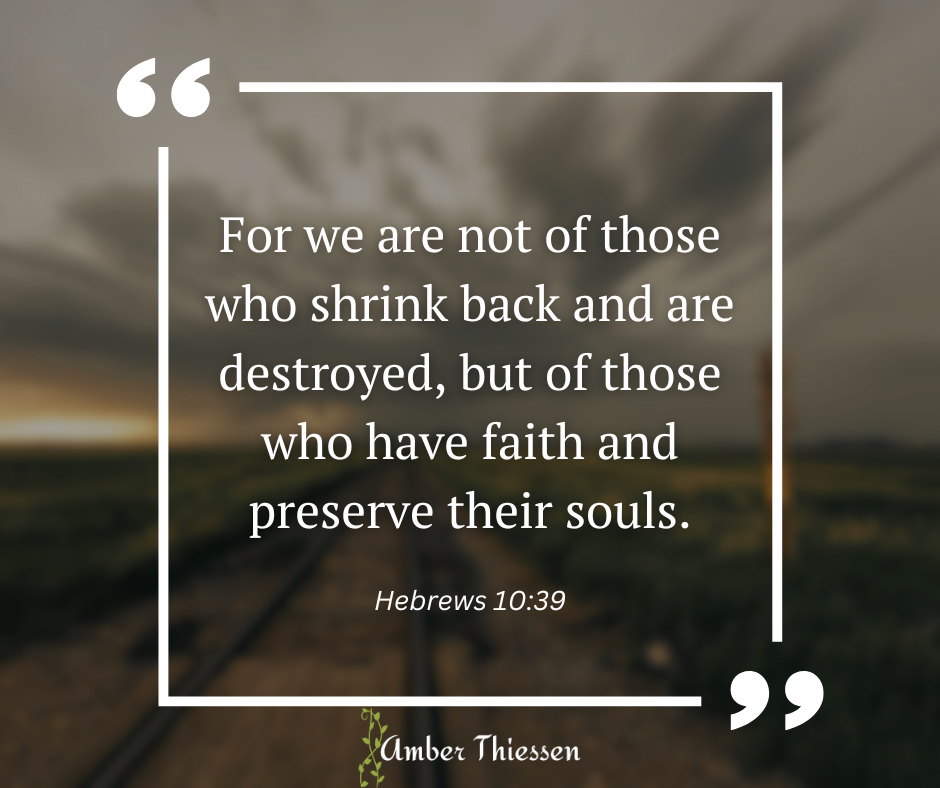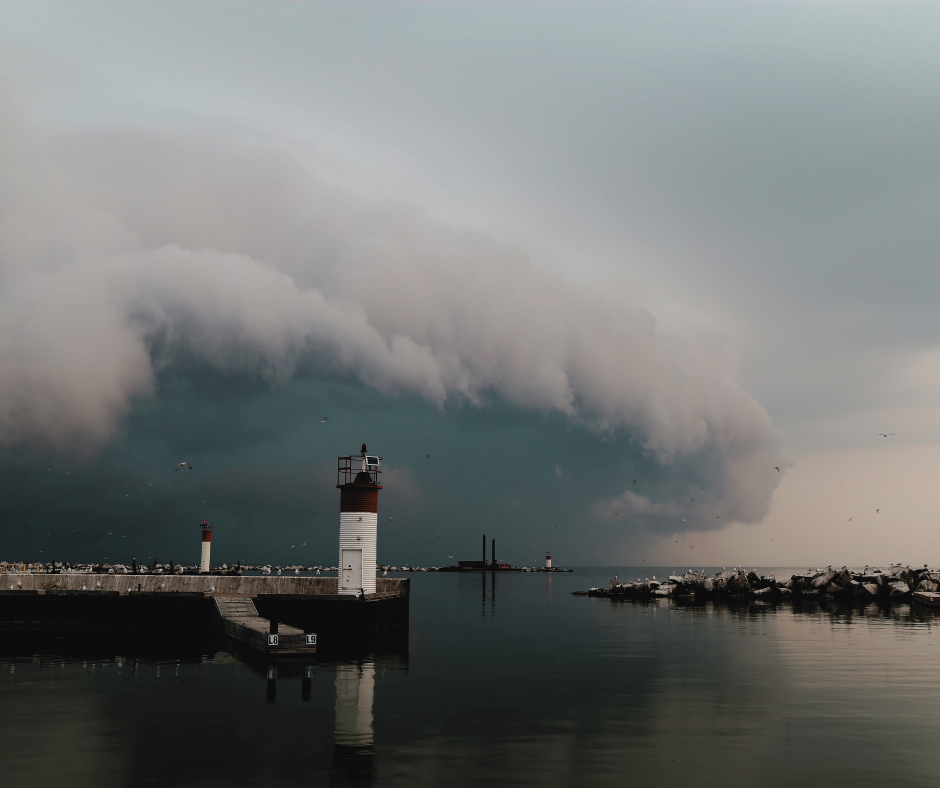When the Storm Rages: Trusting the God Who Holds It All
- Amber Thiessen

- Jul 28
- 5 min read

The tornado warning pops up on my phone while I’m at work. It’s not for my location but for municipalities an hour away—where the Christian college is hosting volleyball camp, and where my daughter is attending. My heart jumps. I immediately check the radar, watching the bright multi-colored blob moving east toward her.
Then, a local weather guy I trust posts an urgent update: he’s spotted rotation on the radar—a potential tornado—and issues a blaring “Take shelter!” notice for a town only 15 kilometers from where she is.
My heart sinks.
I wonder what they’re doing. Are the kids still practicing in the gym, or have they moved to another building for safety? Are they worried? Do they even know what’s happening? It’s only Monday. Her first day at camp.
I pray.
On my drive home from work, the monstrous thunderclouds loom in the distance—a visible reminder that all is not calm. The storm is on the move. And all I can do is pray. I notice I’m more anxious than usual—maybe the recent tragedy at a girls’ camp in Texas has rubbed my heart a little raw.
Once home, I watch the radar closely, relief washing over me as the storm dissipates before reaching the college. I exhale. But I can’t help wondering—why was I so afraid?
This brought me back to my own camp memories. It was the last evening of the week, all of us campers sitting on logs around the bonfire. As tradition held, we each had the opportunity to share something we’d learned about God and then toss a stick into the flames.
Thunder grumbled faintly in the distance as campers spoke of prayers answered, faith growing, and some who’d come to believe in Christ. Then, without warning, a strong rushing wind tore through, shaking the trees violently. A branch cracked loudly above us—and a young, frightened voice shouted, “RUN!”
Chaos erupted. Fifty campers leapt to their feet and scattered. I grabbed my friend’s hand and pulled her toward the chapel—the closest building. Inside, camp counselors prayed and led us in singing while others scoured the grounds with flashlights, searching for stragglers. In the end, there was no tornado—just a drenching rain—but the memory stuck. It became part of camp lore, retold year after year in counselor training when I later worked on staff.
The strength and power of stormy weather rightly makes us nervous. The cutting flash of lightning, the bone-shaking roar of thunder, the force of winds that can bend and break trees—there’s nothing we can do to stop it. Perhaps nothing else so starkly reminds us of our humanity and our dependence on God.

In Matthew 8, we read about Jesus crossing the Sea of Galilee with His disciples when a violent storm suddenly sweeps in, waves crashing over their boat. Facing what feels like certain death, the disciples wake the sleeping Jesus, pleading with Him to save them.
“Why are you afraid, O you of little faith?”
Soaked by the spray, shouting over the roaring wind, gripping the sides of their teetering vessel, I imagine they could only stare wide-eyed as Jesus stood and rebuked the storm with a word.
And there was calm.
Those same wide eyes turned to one another in awe: “What sort of man is this, that even winds and sea obey him?” (8:27).
Only the Creator has authority over nature. Even as the disciples sit in stunned silence, surrounded by still waters, they are grasping that this is no ordinary man—this is the power of God, the One who governs all.
“He made the storm be still, and the waves of the sea were hushed.” (Ps. 107:29)
“He it is who makes the clouds rise at the end of the earth, who makes lightnings for the rain and brings forth the wind from his storehouses.” (Ps. 135:7)
Here we see God’s sovereign power over creation—and the disciples, still learning who Jesus truly is, stand amazed.
This “little faith” stands in sharp contrast to the faith of the centurion earlier in the chapter. The soldier had come to Jesus, pleading for his suffering servant. Though Jesus offered to come to his home, the centurion humbly replied that he was unworthy to host him and asked instead that Jesus “only say the word” (8:8). As a seasoned soldier who both exercised authority and submitted to it, he understood exactly what it meant for Jesus to command with true power.
Jesus marveled at him: “Truly, I tell you, with no one in Israel have I found such faith” (8:10).
There are times when it still feels small and shaky—more like the disciples than the centurion. When I’m caring for patients in overwhelming situations, making parenting decisions that stretch me, or navigating the complexities of leadership, I can feel the weight of my own limitations. In those moments, my faith falters—not because God is any less faithful, but because I so easily shift my focus from Him to myself.
And that’s where the problem lies. When my eyes are fixed on my own ineptness and limitations—on all the ways I can’t control circumstances or outcomes—my confidence crumbles, and fear takes over.
Instead, as Stephen Yuille writes, “Faith is looking at our circumstances, looking at our God, and concluding, ‘I will trust God.’” (The Path of Life). The centurion recognized Jesus’ authority. The disciples stood in awe of it. What we believe about God matters, because “some trust in chariots and some in horses, but we trust in the name of the Lord our God” (Ps. 20:7).
As A.W. Tozer reminds us, "let us begin with God. Behind all, above all, before all is God. He is first in sequential order, above in rank and station, exalted in dignity and honor. As the self-existent One, He gave being to all things, and all things exist out of Him and for Him. Worthy are You, our Lord and our God, to receive glory and honor and power; for You created all things, and because of Your will they existed, and were created." (The Pursuit of God)
As we glimpse God’s greatness, our hearts are stirred to trust Him. When we see His sovereignty not as an abstract doctrine but as a present reality, it changes how we face the unknown—like Abraham embarking on a journey without knowing his destination, Daniel standing in a den of lions, Hezekiah facing the Assyrian army, or Paul preaching to a hostile crowd.
Faith reorients our gaze—away from our weakness and toward His strength—and from that trust flows true contentment. As Melissa Kruger writes, “Biblical contentment is an inward trust in God’s sovereignty and goodness that produces the fruit of joy and peace and thanksgiving in the life of a believer, regardless of outward circumstances.”
So whether we’re watching storms roll toward the places our children sleep, facing unexpected trials at work, or carrying the quiet burdens of leadership and family life, we can rest knowing our hope is secure. Our faith isn’t in our ability to hold it all together, but in the unshakable character of God. “For we are not of those who shrink back and are destroyed, but of those who have faith and preserve their souls” (Heb. 10:39).





Comments